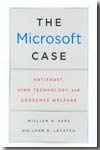The Microsoft case
antitrust, high technology, and consumer welfare
- ISBN: 9780226644639
- Editorial: University of Chicago Press
- Fecha de la edición: 2007
- Lugar de la edición: Chicago. Estados Unidos de Norteamérica
- Encuadernación: Cartoné
- Medidas: 24 cm
- Nº Pág.: 343
- Idiomas: Inglés

Microsoft was the defining antitrust case of our era, and will be the focus of scholarly discussion about the proper role of antitrust for years to come. This book tells the story of the litigation and shows how law, ideology, evidence, and economic theory influenced it at every stage. William H. Page and John E. Lopatka examine the events leading up to the case and the myriad decisions the litigation has produced, enhancing understanding of the case itself and its implications for antitrust law. In 1998, the government charged that Microsoft monopolized the market for personal computer operating systems by suppressing a competitive threat from Netscape's web browser and Sun Microsystems' Java technologies. The central point of contention in the case, both in theory and rhetoric, was whether Microsoft's actions harmed or benefited consumers - and thus whether antitrust intervention was necessary or destructive. This issue was particularly challenging because the conduct involved the design and distribution of complex products in dynamic, high-technology markets. The results of the courts' efforts were mixed. The court of appeals validated Microsoft's introduction of better products at attractive prices, but it also condemned more ambiguous conduct without insisting on adequate evidence of consumer harm. In doing so, the court overrated its own abilities to correct market processes and underrated the powers of the market itself. The courts, however, did reject radical and costly structural relief in favor of temperate conduct remedies aimed mostly at the conduct specifically found to be unlawful. This book is essential reading for business, law, and economics scholars as well as anyone else interested in the ways that technology, economics, and antitrust law have interacted in the digital age.






